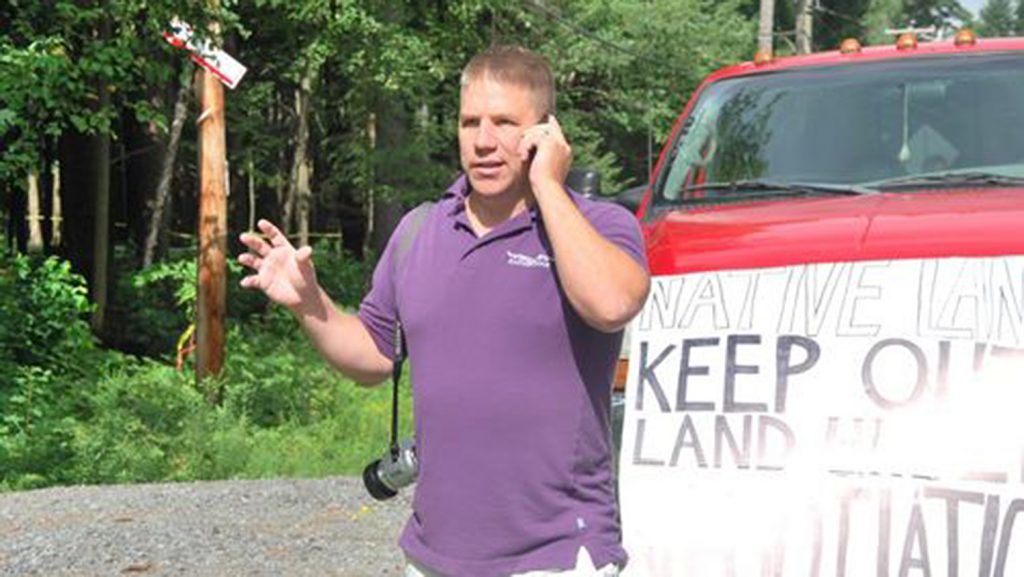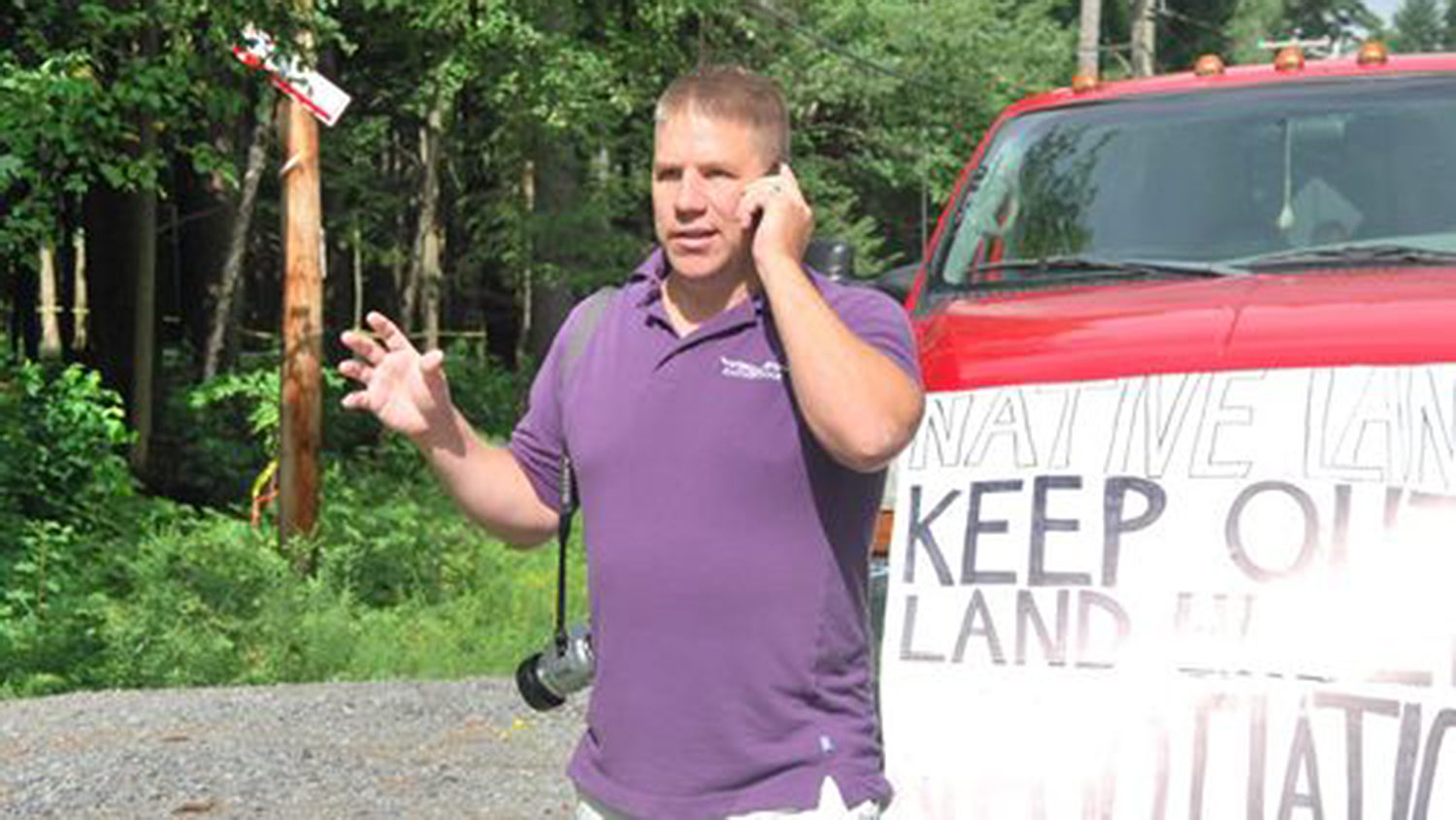
Don’t be fooled by the white Christmas tree, decked out in silver garlands and pink ornaments, on the front page of the Eastern Door’s December 9 edition. Look to its left and read of three local women staying at Standing Rock five days after the US Army halted construction of the North Dakota Access Pipeline. Turn to page five where a headline reads, “Fake Band Cards on the Rise.” Flip ahead to a feature about a 17-year-old who makes jerky from wild game, a review of a documentary examining the “delicate and fascinating question” of Indigenous influence on Quebec culture.
Welcome to the Eastern Door, serving the Kahnawake Mohawk Territory since 1992 “regardless of birth, sex, age, language, politics or religion.” While “The Great Meat Pie Debate rages on and on” (see S4 for details), so does the little paper that could. Circulation 1,133, and rising. Winner of the 2016 Canadian Community Newspaper Award for Best All-Round Newspaper in its circulation category. Winner of numerous Quebec Community Newspaper Association Awards, year after year, often ranking as one of the top three newspapers despite one of the lowest circulation rates in the province. “We hit above our weight the whole time because we care about the community,” says editor and publisher Steve Bonspiel in a phone interview from Kahnawake, Quebec. “We take on the hard stories and we don’t shy away from them.”
“Stay strong my fellow Onkwehón:we, no doubt you will face some hardships.”
Six years ago, not shying away meant breaking a story that earned Bonspiel a Michener Citation of Merit. Eviction notices, sent out by the Mohawk Council of Kahnawake to non-natives living on-reserve, sparked Bonspiel’s interest. The resulting series of stories spurred debate in the community and what the Michener Awards Foundation called a “change in direction” in the Mohawk Council.
When asked about the after effects of publishing the controversial in such a small town paper, Bonspiel laughs. “Oh my god,” he says. “When I write my book I hope you buy a copy, if I’m still alive.” Being a reporter is one of the toughest jobs in the Mohawk community of nearly 8,000, he says. “Even social workers don’t deal with the crap we deal with.” If you join the staff at the Eastern Door, Bonspiel says, “You’re going to lose friends. You’re going to get people that hate you—100 percent. You’re going to get people that want to beat you up—someone will say they want to kill you, burn your house down.” You’ll come across an Internet video that falsely identifies you as a man masturbating, something that actually happened to Bonspiel in 2015, he says. “They try to discredit me. But you can’t back down. You can’t.” Despite the threats, despite being boycotted by sectors of the community refusing to buy the paper or ads four times in the last eight years since he bought the Eastern Door, Bonspiel says, “Journalism is about telling the truth no matter what.” He doesn’t care how many people yell at him, stare at him in the street. “I took that oath to tell those stories,” Bonspiel says, “and I don’t know what it would take for me to stop but as long as I’m alive, I’m going to keep doing it.”

In January 2017, Bonspiel’s oath will turn 14. In 2003, he began his career at the Nation—an independent Indigenous publication serving the Cree of northern Ontario and Quebec and James Bay Territory. He recalls one of his earlier stories—reporting on a two-and-a-half-year-old whose skull had been smashed in by a stick. “I had to interview the guy,” he says. “I had to try. I had to talk to him. I went to court.” It took everything, says Bonspiel, not to give him a piece of his mind. “My job was to report on as much of it as I could, to keep everyone informed.” His reporting led to articles in the Montreal Gazette and Windspeaker, it led to the community rallying around the little boy. “When he came home after seven months of being in the hospital, the whole community showed up at the airport and had a march for him.”
These are the stories Bonspiel tells: Stories that shine a critical light in the shadows where his peoples’ stories have existed for far too long. “I’m not going out there and picking fights and pointing the finger at the Boys and Girls Club,” he says. “I’m talking about stuff that’s serious and needs to be discussed that nobody will point out because they’re scared.” As a member of the Mohawk nation of Kanesatake (“Google ‘Oka Crisis 1990’,” he says), Bonspiel knows that every word he writes comes with the “500 years of colonialism” he carries on his shoulders, as well as the legacy of residential schools, assimilation, genocide. His words critique, praise, teach, defend. They appear in the Toronto Star, CBC. They beckon fellow Indigenous journalists to take up their pens. “We can fight with our minds,” Bonspiel says. “We’re more educated than we’ve ever been.”
Now it’s time to educate what he calls “mainstream Canadians.” Bonspiel says, “whenever people say, in 2016, ‘I’ve never heard about residential schools,’ I think, man, we have so much work to do.” And when journalists call his office, as they do nearly every day asking for information and contacts, Bonspiel has a new answer: come to Kahnawake and see for yourselves. “So many journalists don’t know what Canada was built on,” Bonspiel says. “They don’t know that they’re on Mohawk territory. They don’t know the difference between a Mohawk and a Cree.”
If you do visit Kahnawake and buy a copy of the latest Eastern Door, you’ll see the Christmas tree glittering. You’ll look at the advice this week’s horoscope provides to Libras: “Stay strong my fellow Onkwehón:we, no doubt you will face some hardships.” And, on page two’s editorial, you’ll read what Bonspiel writes of Standing Rock: “We’re hopeful it’s the people who have the last say on their own land.”
About the author
This is a joint byline for the Ryerson Review of Journalism. All content is produced by students in their final year of the graduate or undergraduate program at the Ryerson School of Journalism.
